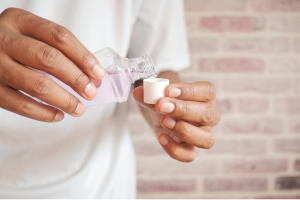Zinc Taste Test – A Zinc Deficiency Test That You Can Do at Home in 1 Minute

Zinc deficiency is almost epidemic. While it is an essential mineral needed nearly in all body tissues, more than 68% of adults receive less than two-thirds of the RDA for zinc. Also, vegetarians can need up to 50% more zinc than non-vegetarians due to phytates found in the fiber of most vegetables and grains. Phytates inhibit the absorption of zinc; drinking tea and coffee, and high intakes of calcium, iron and copper can also limit zinc absorption.
Zinc is involved in over 200 different enzymatic reactions in the body and plays a vital role in DNA synthesis, normal growth and neurological development during pregnancy, childhood, and adolescence. It is also needed for hormone production, immune function, reproductive system, wound healing, taste, and smell. The highest concentration of zinc is found in muscle (65%), brain, liver, kidney, skin, pancreas, eye retina, and in the male prostate gland and sperm. It is therefore critical to test the level of zinc in the body.
Since the ability to taste zinc is directly proportional to the body’s reserve of this nutrient, performing a Zinc Taste Test is an easy, cost-effective way of measuring your total zinc status in less than 1 minute.
Zinc Taste Test Procedure

First, purchase liquid zinc, preferably zinc sulfate (15 mg) from any health food store. Make sure you don’t eat, drink, or smoke for at least a half hour prior to the test. Put 2 teaspoons of the zinc solution in your mouth, swirling it for 30 seconds, then simply swallow it or spit it out.
Take note of your reactions to the zinc, expressed either as facial expressions or verbal comments. In the mouth, there is an enzyme polypeptide called gustin that is responsible for identifying the specific taste of zinc. This will allow you to estimate your zinc levels, by the intensity of the zinc you taste.
- If the zinc solution is tasteless or tastes like water, that indicates that you are very zinc deficient, and high supplementation of zinc is needed.
- A mild metallic taste reveals that you are slightly zinc deficient, and a moderate supplementation of zinc is needed.
- Finally, a strong, bitter or highly metallic taste indicates that your zinc levels are adequate and no extra supplementation is warranted at this time.
In the case of zinc deficiency, eating foods rich in zinc is highly recommended, such as seafood (especially oysters), meat, dairy products, nuts, whole grains and beans. In severe zinc deficiency cases, supplementation is required.
Categories
Categories
Humanized Health - NEW!
Learn about personalized health from top experts! Check out our fascinating new shows every week, available as videos, podcasts and transcripts.:
Our Bloggers
-
 Paula Gallagher
Paula Gallagher
Paula is a highly qualified and experienced nutrition counselor on the staff at Village Green.
read more.. -
 Margo Gladding
Margo Gladding
Margo's impressive knowledge base is the result of a unique blend of educational and professional experience.
read more.. -
 Dr. Neal Barnard
Dr. Neal Barnard
Dr. Barnard leads programs advocating for preventive medicine, good nutrition, and higher ethical standards in research.
read more.. -
 Dr. Joseph Pizzorno
Dr. Joseph Pizzorno
Dr. Joseph Pizzorno, ND is a pioneer of integrative medicine and a leading authority on science-based natural medicine.
read more.. -
 Debi Silber
Debi Silber
Debi is a registered dietitian with a master’s degree in nutrition, a personal trainer, and whole health coach.
read more..
SEE ALL OF OUR BLOGGERS


Village Green Apothecary
5415 W Cedar Ln
Bethesda, Maryland, 20814
(301) 530-0800
Toll Free: (800) 869-9159
The information provided on this site is not intended to be a substitute for advice or treatment from a qualified physician, nor is it intended to diagnose or treat a health problem or disease. Consult your physician prior to starting any new health program or if you any questions regarding a medical condition.
© 2025 Village Green Apothecary - All Rights Reserved.



